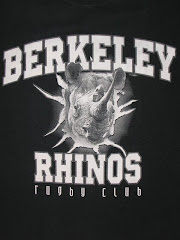On Wednesday I had a chance to speak with David Williamson, one of three coaches for the Berkeley Rhinos Rugby Club. The club is primarily made up of Berkeley High School Students, although it has members from all over the East Bay. The club consists of three teams: a boys varsity team, boys Sophomore–Freshman team and an all levels girls team.
The Rhinos are currently recruiting, especially for the less experienced team. Their first practice is on Tuesday, November 29, and they hold practices every Tuesday, Thursday, and Saturday. The Rhinos’ season runs from February through mid–April, rain or shine. The Rhinos are part of the Northern California Youth Rugby Association, a group consisting of about 3,000 players divided into several conferences.
Despite being the national sport in countries like New Zealand and Wales, rugby is fairly obscure in the U.S. However, the sport is growing in popularity due to being televised by stations such as NBC and, perhaps, by efforts like Mr. Williamson’s. Just last year rugby was made an official Olympic sport, and will be featured in the 2016 Olympics in Rio de Janeiro.
The biggest difference between the professionals and the Rhinos’ league is that while pros play games of seven versus seven, the Rhinos play fifteen versus fifteen, which creates a very different type of game. In addition, the Rhinos league can switch out players freely, ensuring that everyone gets a chance to play.
Mr. Williamson, now retired, has been coaching the team for seven years. He played Rugby as a kid, starting in 1973. “My older son played, then I went out to help as a parent. I started working with the coaches ... I then took over as head coach seven years ago,” he explained. When asked why he coaches, he replied, “I love the game and I want to encourage other people to play it and enjoy it as well and spread the spirit of the sport.” This spirit, he said, compared to a lot of other sports, “is more inclusive, based on respect of the opponent and officials.” After a game, the home team will host a meal for the opposing team. When asked what motivates him to continue coaching, he said, “It’s a great group of kids and a great sport. To see them learn and improve is very rewarding.”
Although very physical and athletic, rugby is also very much a thinking sport, even if you’re on the sidelines. “You can learn a lot by playing [and] you can learn a lot by watching,” Williamson said. The biggest difficulty for players, other than finding time, is “to get in shape so that you can think on your feet.” Planning and preparation are also critical. In addition, despite appearances, rugby is fairly safe. Although rugby players wear very limited protection, even when tackling other players (which is done in a manner to prevent head injury), there were only five injuries in a team of about fifty.
However the biggest component of rugby, more than physical or mental prowess, is spirit. “A lot of rugby is desire — how much heart you have. It takes time and energy to devote to it,” Williamson said. But you don’t have to be the best rugby player in the world to play. As Wiliamson puts it, “If you come to practice you’ll play.”
Tuesday, December 6, 2011
Subscribe to:
Posts (Atom)




